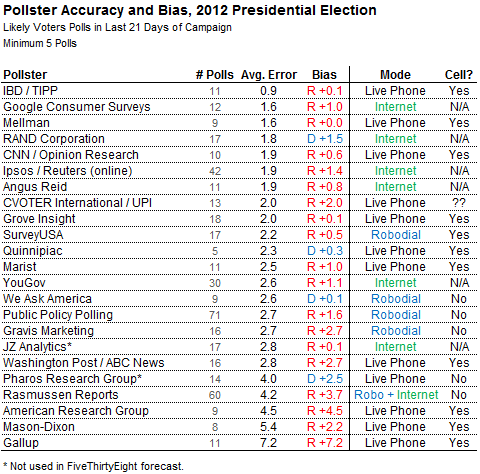Among the many "actual, lived truth[s]" to which last week's election ought to awaken Republicans, add the hard fact that pollsters did not conspire to cook all of their books to favor President Obama. Stats king Nate Silver reviews the performance of 23 major polling outfits and finds that only four showed recognizable Democratic bias.

In the last three weeks of the campaign, 12 out of the 23 major pollsters overstated Mitt Romney's position by one point or more. Gallup, one of the most trusted pollsters, did worst, overselling Romney's prospects by 7.2 points.
Now these numbers do not establish that there was a pro-Romney conspiracy. But they do puncture one more paranoid fantasy of the persecution-complex conservatives, who assert against all evidence that liberals are rigging the system against them.

I hope this puts a stake through Rasmussen polling which was a useful propaganda tool for the GOP and the now-defunct Tea Party movement in 2010 – especially in South Dakota. Robo calls are ridiculously less effective than live operators, and incomplete databases that lack cell numbers will oversample Republicans and miss non-whites and voters under 40. A live operator can far more effectively make sure the respondent is the right person and measure sincerity and intensity of respondents’ views.
With polling, like most other worthwhile things, you get what you pay for. Cheaper and faster rarely achieves better.
Guess we can stop obsessing about polls and start thinking about practical matters.
The bigger yet largely missing story here of the analysis of Nate Silver, Votamatic, and Professor Allan Lichtman is the imperative for a STEM education, or for those lacking one to rely on the thinking experts as opposed to the feeling experts.
Yes, we need good science and math education so people can understand and evaluate the analysis of Silver, Linzman, Lichtman, et al. But we also need strong humanities education to put their science in practical and moral social context. STEM will tell us what is; the humanities help us decide what ought to be.